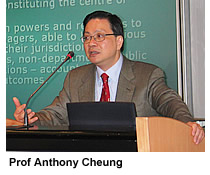Scholars explore landscape of Asian governance
Professor Ian Holliday, Dean of the Faculty of Humanities and Social Sciences and one of the co-organizers—the other two being Dr M Ramesh of the National University of Singapore and Dr James Tang of the University of Hong Kong—said the Congress was an excellent opportunity to welcome scholars from all over Asia to CityU to debate the many political challenges now facing the region.
“Building on the success of the first APISA Congress, the second Congress again helps establish APISA as a major regional force in political science and international studies,” Professor Holliday said.
The Congress covers several disciplines taught in FHS and helps promote the internationalization strategy to which the Faculty and the University have long been committed.
“The murals exhibit a graceful combination of traditional Chinese cultural elements with Western means of expression. They are a fusion of East and West, Asian and Non-Asian, the old and the new,” Professor Chang said.
The murals demonstrated the University’s commitment to modern professional education, buttressed by deep-rooted humanistic values, and illustrated the technological competence and cultural literacy that underpin CityU’s persistent drive to “nurture and develop students’ talents” and to “create applicable knowledge”, he added.
Professor Chang also stressed that CityU respected academic freedom because ideas matured more effectively in such an environment.
Two plenary speakers, Dr J P Nereus O Acosta, House of Representatives in Congress of the Republic of the
Congressman Acosta, speaking on the topic “Leadership, institutions and democracy”, said that conflicting views about governance helped motivate people to identify new ways to change and improve our lives.
In his address, Dr Acosta highlighted some major areas of interest—economy vs ecology, and efficiency vs transparency—that the authorities concerned and/or scholars should pay more attention to.
In his presentation entitled “Hong Kong’s governance: continuity and change”, Professor Cheung spoke about the changes to Hong Kong’s political and governance system that had taken place since Hong Kong entered the transitional period to become a special administrative region of China. He also examined the transformation of the local civil service.
In this three-day event, 35 panel sessions will cover a range of issues and topics related to governance in different parts of
APISA was created in November 2001 when a group of scholars from around the region agreed to launch an Asian-based organization dedicated to the advancement of political and international studies.
APISA, as an independent, non-governmental, non-profit organization, aims to promote research, teaching and publication of political and international studies in and on
The First APISA Congress was held in




